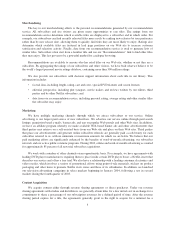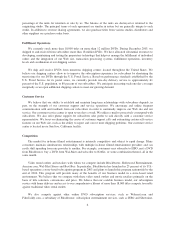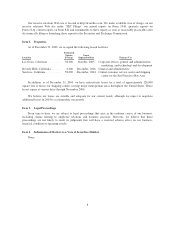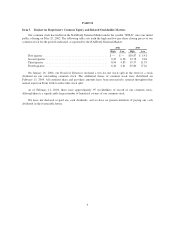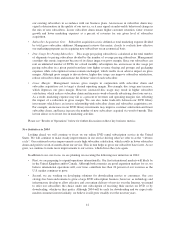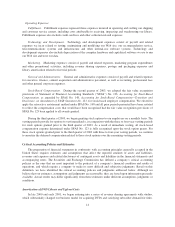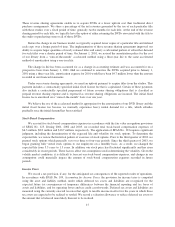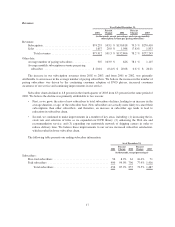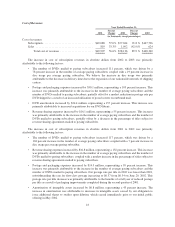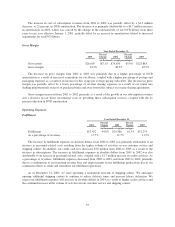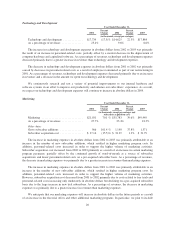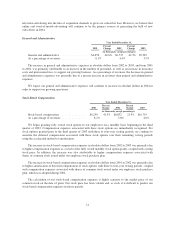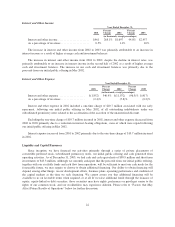NetFlix 2003 Annual Report Download - page 30
Download and view the complete annual report
Please find page 30 of the 2003 NetFlix annual report below. You can navigate through the pages in the report by either clicking on the pages listed below, or by using the keyword search tool below to find specific information within the annual report.Operating Expenses:
Fulfillment. Fulfillment expenses represent those expenses incurred in operating and staffing our shipping
and customer service centers, including costs attributable to receiving, inspecting and warehousing our library.
Fulfillment expenses also include credit card fees and other collection-related expenses.
Technology and Development. Technology and development expenses consist of payroll and related
expenses we incur related to testing, maintaining and modifying our Web site, our recommendation service,
telecommunications systems and infrastructure and other internal-use software systems. Technology and
development expenses also include depreciation of the computer hardware and capitalized software we use to run
our Web site and store our data.
Marketing. Marketing expenses consist of payroll and related expenses, marketing program expenditures
and other promotional activities, including revenue sharing expenses, postage and packaging expenses and
library amortization related to free trial periods.
General and Administrative. General and administrative expenses consist of payroll and related expenses
for executive, finance, content acquisition and administrative personnel, as well as recruiting, professional fees
and other general corporate expenses.
Stock-Based Compensation. During the second quarter of 2003, we adopted the fair value recognition
provisions of Statement of Financial Accounting Standards (“SFAS”) No. 123, Accounting for Stock-Based
Compensation, as amended by SFAS No. 148, Accounting for Stock-Based Compensation—Transition and
Disclosure, an Amendment of FASB Statement No. 123, for stock-based employee compensation. We elected to
apply the retroactive restatement method under SFAS No. 148 and all prior periods presented have been restated
to reflect the compensation costs that would have been recognized had the fair value recognition provisions of
SFAS No. 123 been applied to all awards granted.
During the third quarter of 2003, we began granting stock options to our employees on a monthly basis. The
vesting periods provide for options to vest immediately, in comparison with the three to four-year vesting periods
for stock options granted prior to the third quarter of 2003. As a result of immediate vesting, all stock-based
compensation expense determined under SFAS No. 123 is fully recognized upon the stock option grants. For
those stock options granted prior to the third quarter of 2003 with three to four-year vesting periods, we continue
to amortize the deferred compensation related to those stock options over the remaining vesting periods.
Critical Accounting Policies and Estimates
The preparation of financial statements in conformity with accounting principles generally accepted in the
United States requires estimates and assumptions that affect the reported amounts of assets and liabilities,
revenues and expenses and related disclosures of contingent assets and liabilities in the financial statements and
accompanying notes. The Securities and Exchange Commission has defined a company’s critical accounting
policies as the ones that are most important to the portrayal of a company’s financial condition and results of
operations, and which require a company to make its most difficult and subjective judgments. Based on this
definition, we have identified the critical accounting policies and judgments addressed below. Although we
believe that our estimates, assumptions and judgments are reasonable, they are based upon information presently
available. Actual results may differ significantly from these estimates under different assumptions, judgments or
conditions.
Amortization of DVD Library and Upfront Costs
In late 2000 and early 2001, we began entering into a series of revenue sharing agreements with studios,
which substantially changed our business model for acquiring DVDs and satisfying subscriber demand for titles.
14



